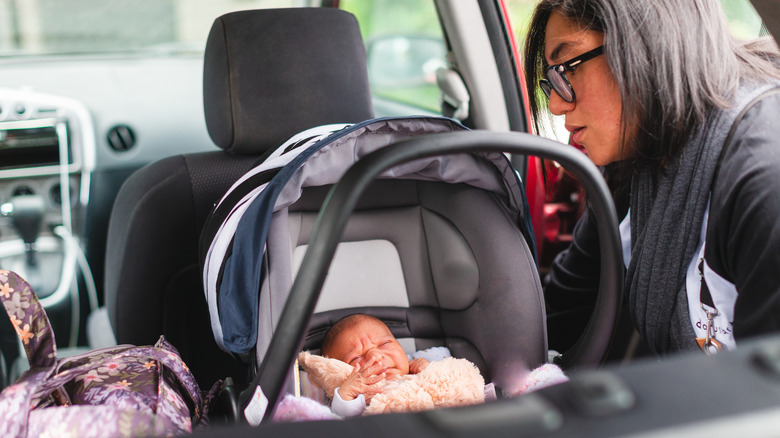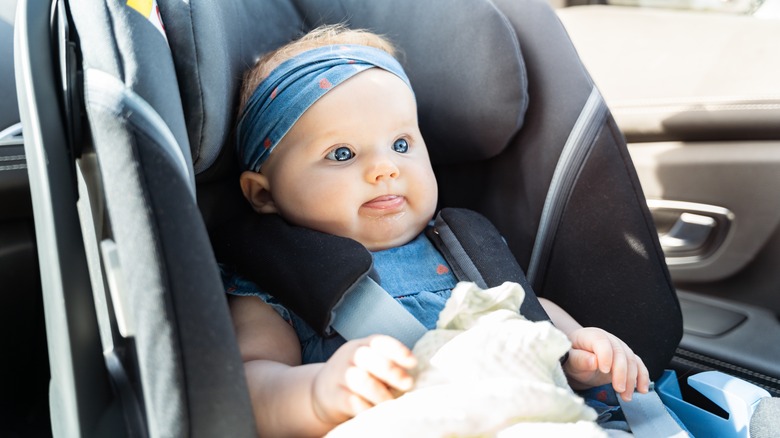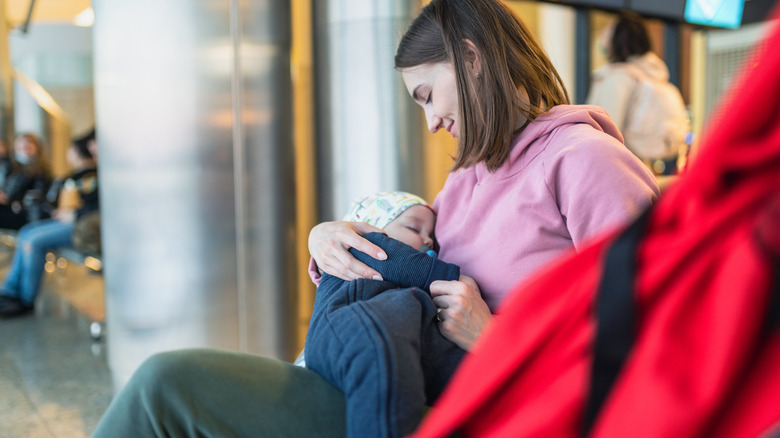Is It Safe To Take A Road Trip With A Newborn? A Pediatric Nurse Practitioner Weighs In
Road trips are one of the best ways to make lasting memories as a family. Packing up the car and venturing off to a new place can be an exciting experience for both adults and children, filled with fresh sights, goofy road trip songs, and made-up games. But could your little one be too young for the ride — particularly newborn babies?
We reached out to Dr. Anna Villasuso, a pediatric nurse practitioner at The One Tribe, to learn the dos and don'ts of road-tripping with an infant, from city-hopping to scenic jaunts through the country. The good news: Taking a newborn on a long car ride is generally A-okay, according to Dr. Villasuso. However, you may have to adjust your usual road trip routine to accommodate your baby's needs.
Along with many other tips, Dr. Villasuso shares that awareness of time is vital. "The American Academy of Pediatrics advises that newborns and infants shouldn't spend more than two hours in a car seat within a 24-hour period, in order to avoid any strain on their spine and potential breathing difficulties," says the expert. As a result, she recommends making frequent stops to remove your child from their seat. Besides adjusting your little one's posture, these breaks are also a good time for diaper changes and feeding sessions.
How to keep your newborn safe and comfortable on the road
Breaks aren't the only way to make road trips with your newborn less stressful and uncomfortable for all involved. Dr. Anna Villasuso shared a few other essential tips to keep your baby safe and sound. First, carefully inspect your child's car seat before hitting the road. "Most importantly, ensure that the car seat is correctly installed and that the baby is properly secured," the pediatric nurse practitioner urges. She advises to keep it in the backseat in a rear-facing position throughout the journey.
Once you're ready to begin your trip, keep some favorite items within reach. Dr. Villasuso suggests packing familiar toys, blankets, and pacifiers; skip any items that could pose a choking hazard (you never know when you might have to brake suddenly). If you rely on formula, keep it close by and stick to your baby's regular feeding schedule "to avoid unnecessary fussiness." The medical expert also suggests parents stock up on sanitizing gel and wipes to avoid spreading harmful germs to newborns.
If your baby gets fussy, try turning on soft music or white noise, which Dr. Villasuso says can be calming for infants. Additionally, consider adjusting the temperature in the vehicle: "Newborns can be sensitive to temperature changes, so avoid extreme heat or cold."
When to choose flying over driving with a baby
If frequent stops and days spent on the road sound like too much for your newborn, Dr. Anna Villasuso suggests that you might want to consider flying. "Flying can be a better option for long distances because it can be quicker, reducing the time the baby needs to spend in a car seat," she says. There are a few points to note with this mode of transport, such as age restrictions and where to sit when flying with a baby. "Babies less than seven days old are not permitted to fly," Dr. Villasuso explains. Your bundle of joy should also be healthy and vaccinated before visiting destinations with known outbreaks of viruses or diseases.
Just as with road trips, some preparation is required before flying with a newborn. The pediatric nurse practitioner reminds parents to have any necessary travel documents ready in advance, such as a passport or medical documents. When booking a flight, she suggests choosing a time that coincides with your baby's sleep schedule to make it easier for them to relax and nap on the plane. Finally, a crucial tip to keep in mind on flight day: "Try to breastfeed or bottle-feed during takeoff and landing to help ease ear pressure," Dr. Villasuso recommends. This is an easy way to prevent ear-popping pain and dodge in-flight crying fits.


